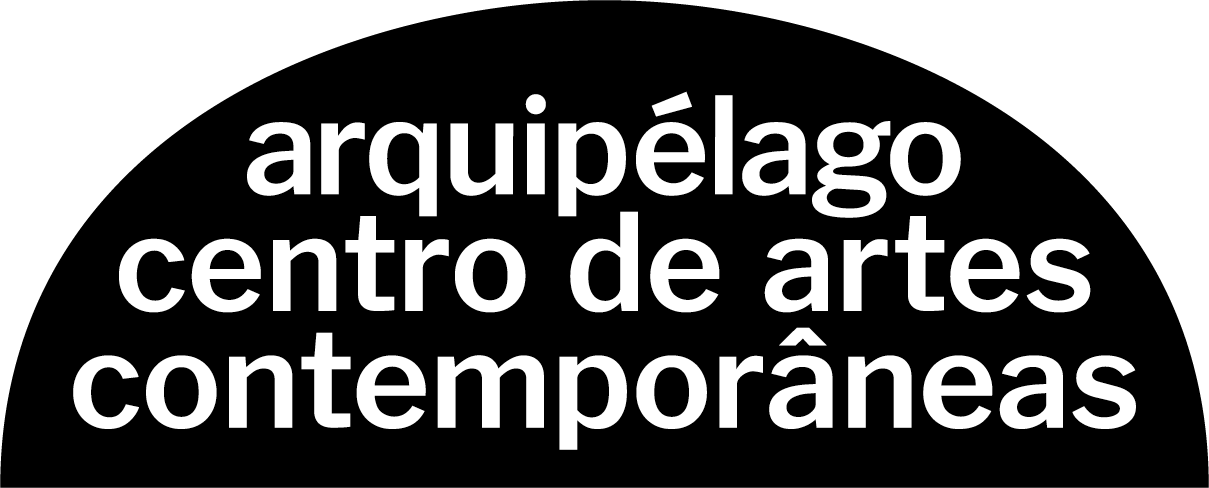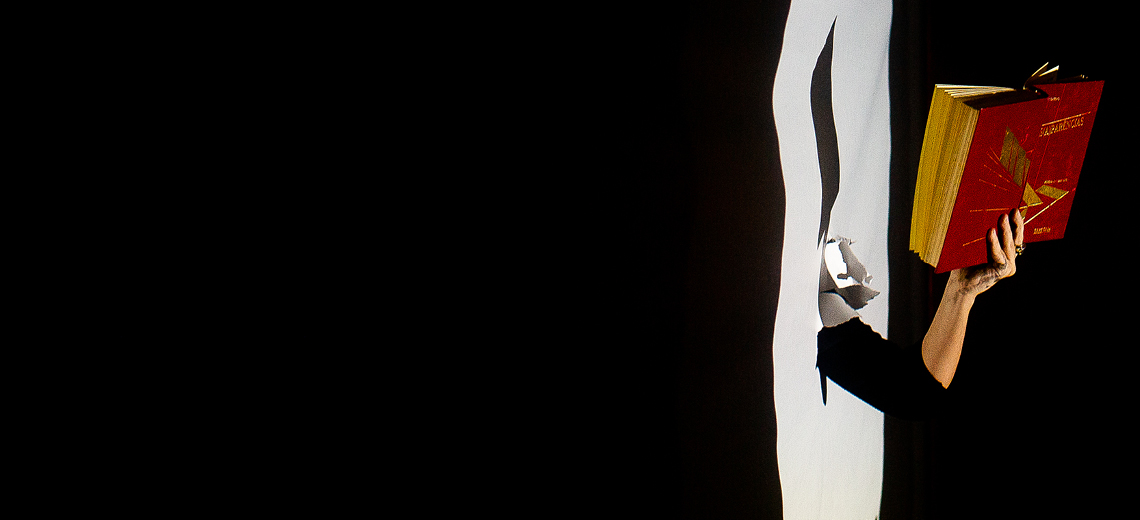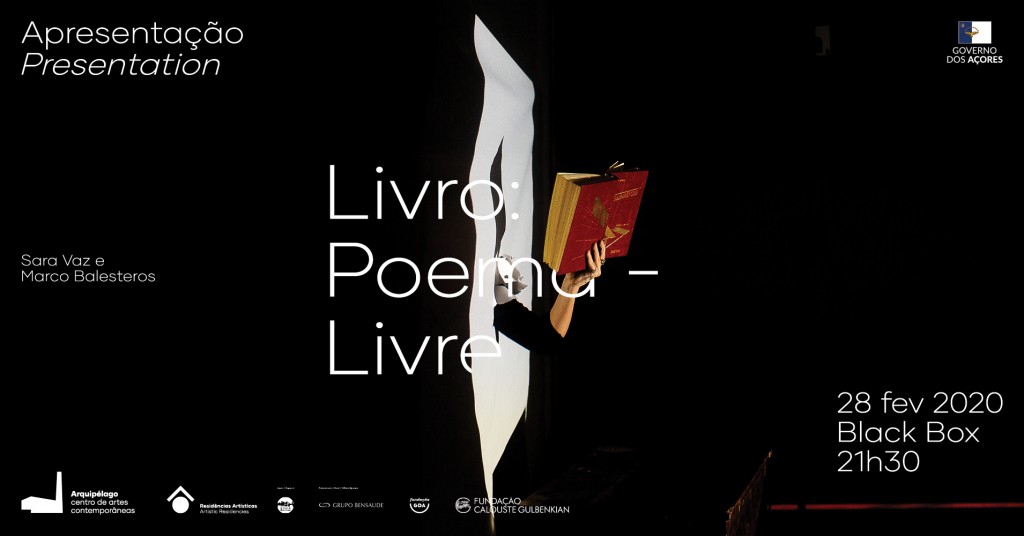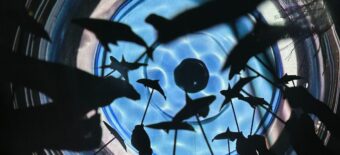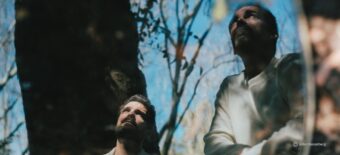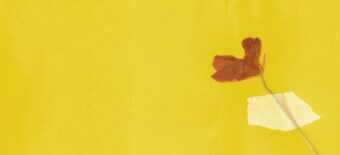PRESENTATION
“LIVRO: POEMA – LIVRE”
Show
Feb 28th 2020PRESENTATION
LIVRO: POEMA – LIVRE
Sara Vaz & Marco Balesteros
with Diogo Alvim, Tiago Barbosa, João Dias
Feb 28th 2020
Black Box
9.30 pm
The ARQUIPÉLAGO – Contemporary Arts Centre will host the Artistic Residence new project of Marco Balestros and Sara Vaz.
Project supported by Fundação GDA and Fundação Calouste Gulbenkian.
Synopsys
LIVRO: POEMA-LIVRE investigates the relationship between stage and book and takes as its starting-point a research project under the form of 5 ESSAYS — ESSAYS FOR BOOK-CHARACTER — #1 Of Image, #2 Of Sound, #3 Of Text or Of Narrator, #4 Of Light, #5 Of Body.
Each one of these languages was approached as a CHARACTER — CARACTERE — playing with the double sense contained in this word, on one hand, the indivisible typographic symbol of writing, on the other and in a metaphoric sense “brand, impression or symbol in the soul”.
From the 5 investigations results a LIBRARY OF THINGS — Books, fragments, gestures, devices, drafts, loose pages, texts without origin — to which we will now access in LIVRO: POEMA-LIVRE.
LIVRO: POEMA-LIVRE investigates the seminal work of E.M. de Melo e Castro, concrete poetry pioneer in Portugal, writer, artist and performer. He sees himself in the narrow relationship that the AESTHETIC OPERATORS kept with the language, the book, the installation and the performance.
LIVRO: POEMA-LIVRE is a triptych — three intersecting works — a show, an artist’s book, and a performative installation.
Ticket | Free
//
Biographical Notes
DIOGO ALVIM
Diogo Alvim is a composer who works mainly in the fields of instrumental and electroacoustic music, as well as sound art. He studied architecture and music composition in Lisbon and completed his PhD studies in composition and sound art at the Sonic Arts Research Center at Queen’s University Belfast. In his research, he explored the different relationships between music and architecture. He presented works in various contexts, of which the following stand out: the 6th and 7th Workshops of the Gulbenkian Orchestra for Young Composers (2008 and 2009); Festival Música Portuguesa Hoje, o CCB, Lisbon (2008); International Rostrum of Composers (UNESCO), Paris (2009); Festival Synthèse 2009, Bourges; Prémio Jovens Músicos 2009 (commissioned by Antena 2/ RTP); Festival Música Viva 2013 (Miso Music); ICMC2012 Ljubljana (with the Unlikely Places collective); Notation in Contemporary Music (Goldsmiths University, London, 2013); Ibrasotope#60 and Museu de Arte Contemporânea da Universidade de São Paulo, Brazil (2014); Belfast Festival 2014 (with Matilde Meireles); Sonorities Festival 2015 (with the Royal String Quartet); Do Liminar#6 (Galeria Zaratan, Lisbon, 2016), Habiter l’exposition The House of Dust (CNEAI, Pantin, France).
He is a professor of Sound Arts Escola Superior de Artes e Design, Caldas da Rainha. He has been developing several collaborations with visual and sound artists, choreographers and stage directors.
ZECA IGLÉSIAS
He studied music and electric bass at Luíz Vilas-Boas Jazz School — Hot Club of Portugal.
As a musician he participated in the plays Barulhada of Tânia Carvalho and Hurra, Arre, Apre, Irra, Ruh, Pum, Honor to Cristina de Pina de Luís Guerra. He was also part of the musical project Moliquentos and participated in several performances promoted by the Cultural Association Bomba Suicida.
In 2011, after a six month professional internship at the National Theater of São João, he began his course as a stage technician and lighting technician.
He signs and goes, national and international, with the lighting works Icosahedron, 27 Ossos, Reverso das Palavras, Síncopa, A Tecedura do Caos, Glimpse-5 Room Puzzle, Captado pela Intuição and Um Saco e uma Pedra — dance play for screening of Tânia Carvalho; Qqywqu’ddyll’o’, 1ª Dança of Urizen, Nevoeiro, Vento, Trovoada e Tundra of Luís Guerra; Pastiche of Luiz Antunes and Sérgio Diogo Matias; Kid as King and A Deriva dos Olhos of Bruno Senune; Hector of André Mendes; Mute e Dança de Materiais Inertes #3 — Movediço of Marta Garcia Cerqueira, Loop of Sérgio Diogo Matias, and E.le.men.to e Gesto Perante Os Desacatos Do Mundo of Bruna Carvalho .
As technical director he worked with Sofia Dias and Vitor Roriz, with Joana Von Mayer Trindade, and in events and presentations promoted by the Dance Forum Cultural Association and by the O Rumo do Fumo.
TIAGO BARBOSA
Tiago Barbosa was born in 1970, in Lisbon. He studied acting and theatre at the Escola Superior de Teatro e Cinema. He worked as an actor and performer, in theatre and dance shows, directed by Miguel Castro Caldas, Gustavo Ciríaco, Nuno Gil, Jorge Andrade and Miguel Pereira, Ainhoa Vidal, Paula Sá Nogueira, Maria Gil, Dinarte Branco and Tiago Nogueira, Martim Pedroso, Mónica Calle, Bernard Sobel, Miguel Loureiro, Lúcia Sigalho, Francisco Alves, João Lourenço, Rita Natálio, Joclécio Azevedo, Vítor Hugo Pontes, Inês Jacques, António Pires, Catalina Buzoianu, Jorge Silva Melo, Adelino Tavares, Paulo Lages, Renata Portas, Marcos Barbosa, and Edward Fão, among others. He made several appearances in TV series and soap operas. In cinema, he has worked with directors such as Sandro Aguilar, Francisco Manso, Manuel Pradal, and others. He participated in the art and neuroscience project “Raízes da Curiosidade”.
He directed the theatre show “A Grande Sombra Loira”, based on sonnets by Florbela Espanca, and wrote and directed “OLÁ, EU SOU O PAI NATAL”.
—
Sara Vaz has been expressing her artistic work on a transdisciplinary territory, putting the body language on an intersection with other languages, in particular the cinematographic language and literature, as a way of questioning and investigating a choreographic and SCENIC WRITING.
Marco Balesteros explores the book as an expanded and performative territory: the idea of BOOK-REHEARSAL-the book as an instigating and speculative space around the production of knowledge and the idea of BOOK-OBJECT-TO-LEARN- book as a collaborative space and of dialectic game, an investigation/discussion space and of temporary writing.
The collaboration between Sara Vaz and Marco Balesteros began in 2017. Since then, they have been focusing their artistic work around the relationship between stage and book, the relationship between stage writing and editing, researching the book as another performative space and a possbible extension of the stage and the stage as a writing space where the actor/author/performer registers their character.
